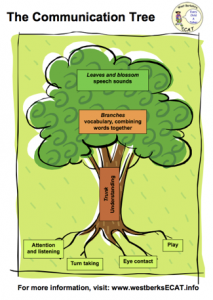Supporting Communication and Language – Every Child a Talker (ECAT)
The whole team are involved in supporting children’s early language development. Working within the ECAT initiative our main goals are to:
- Identify and support children who may be “at risk of delay”
- Develop the knowledge and skills of all the practitioners who work within the setting
- Help parents understand the stages of development of speech and language skills and how they can encourage their child’s development.
Difficulties with speech, language and communication skills, can impact on children’s ability to learn, their education and their long term future. Our aim is that through early identification of a SLC need we can work in conjunction with Parents to help to improve a child’s Speech, Language and Communication development enabling better overall long term outcomes.
We use a tree to represent how communication develops from the foundations of language (the roots of the tree) to the use of clear speech sounds (the leaves at the top of the tree).

Supporting Speech and Language through play
Small group adult-supported activities
These are great opportunities to help support and extend children speech, language and communication skills, as we can give individual attention to all children as they are turn taking, (also an important part of communication) mirroring language they are already using and introducing new words to extend vocabulary.
Sharing Stories
We often read the same story multiple times allowing children to hear the vocabulary again. Children need to hear new words up to 500 times in different ways to enable them understand it and use it correctly in their speech. As children become more familiar they may hear rhyming words, join in with repeated refrains and begin to suggest what might happen next.

“Reading and Writing float on a sea of talk”
(James Britton – Educationalist)
Talking tips for Parents
- Observe, wait, listen: Your child may be playing an interesting and imaginative game that you can join in with. By following the O.W.L tip you can better engage in your child’s game, following their lead and using relevant language to support and extend their vocabulary.
- Get down to your child’s level: This will give your child the chance to make eye contact with you and to watch your facial expressions.
- Let your child take the lead: Your child will learn more from an activity that they are interested in. We refer to this as “Child-initiated” and it puts children in control of their learning. By following your child’s interests you can support current language and introduce new words extending their vocabulary. By following their lead in an activity you can build on existing knowledge and help children discover something new. For example, if you were building a tower and talking about height you could introduce measure. How can we measure it in different ways, against them, with a ruler etc – extending knowledge and understanding.
- Encourage your child to communicate in any way possible: If your child points to the item that they want when you offer them a choice, name the item and repeat the word several times for them to hear. Communication is more than speech, we use gestures and facial expressions to help convey our thoughts and express ourselves. By getting down to your child’s level they will begin to learn how to read gesture and facial expressions, also enabling them to mirror what you are doing and use it themselves.
Did you know……...Speech and language studies have shown that a child may need to hear a word up to 500 times to be able to confidently understand what it means and use it in different contexts.
Speech, Language and Communication information and guidance for parents
Organisations:
National Literacy Trust: Resources and tools for early language development and parental engagement.
ican.org.uk I CAN is a charity that works to support all children Speech, Language and Communication development. It offers various programmes and services throughout the UK.
The Royal College of Speech and Language Therapists A website that explains how to find a Speech & language therapist.
The Communication Trust : is a coalition of over 50 not-for-profit organisations. Working together to support everyone who works with children and young people in England to support their speech, language and communication.
www.speechtherapy.co.uk This site will provide links, information and resources for those affected by communication disabilities and their families
Contact – For families with Disabled Children: Advice and support on many issues faced by parents of children with disabilities.
Resources:
Toddler Talk is an activity pack aimed at children from 18 months to 3 years that promotes communication development from the charity Ican.
The SLI Handbook a S&L guide for parents.
The Hello Campaign: Listen up is a free resource for parents to help encourage play that builds upon listening, understanding and interaction.
Talking Point: An interactive “Progress checker’ to assist parents in roughly identifying their Child’s Speech, Language and Communication developmental stage and ways to support them.
Raa Raa The Noisy Lion: Shown on CBeebies every weekday at 3.30pm exploring communication through rhyme, repetition, rhythm and retelling. Activity packs are available on the website.
West Berks ECAT Information: Talking tips for parents, advice and activities to support Speech, Language & Communication.